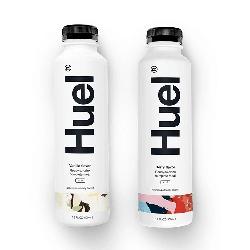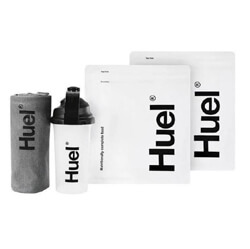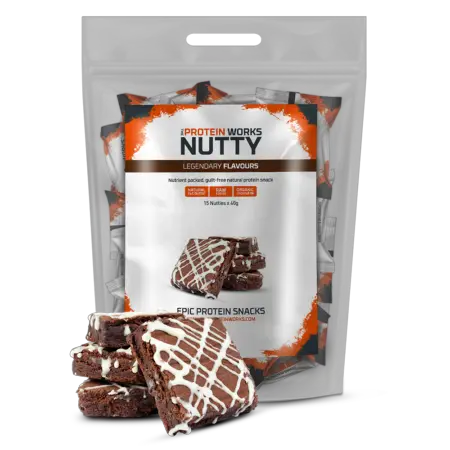Home / Huel / Myvegan / Supplement Reviews / Myvegan Whole Fuel Blend vs. Huel: A Complete Review
Myvegan Whole Fuel Blend vs. Huel: A Complete Review
13/09/2020share
tweet
share

Myvegan Whole Fuel Blend vs. Huel: A Complete Review
Until recently:
Huel was the only product available in the UK that allowed you to get 100% complete nutrition from a couple of scoops of powder mixed with some water or milk.
Now,
Similar products have started to pop up which have been specifically formulated by some well known brands, including: Myvegan, Myprotein and The Protein Works.
In this review, we’ll be comparing how Myvegan’s Whole Fuel Blend compares to Huel and what the major similarities and differences are.
Does Whole Fuel offer greater nutrition?
Is the taste far superior?
Is it markedly cheaper?
There’s only one way to find out… by pitting both products against each other.
Let’s get into it.
About Myvegan

Myvegan are part of The Hut Group’s roster of sports nutrition and fitness brands with an emphasis on the vegan market.
Boasting world-class production facilities and using only the finest ingredients, Myvegan aim to produce high quality, healthy and exceptionally tasty vegan products.
They were developed with a desire to make living a plant-based life as simple and convenient as possible and continue to grow at a rapid pace.
What is Whole Fuel Blend?

Myvegan’s Whole Fuel Blend is a nutritionally-complete shake containing a healthy blend of carbohydrates, protein, fat and dietary fibre per serving.
It is also fortified with added vitamins and minerals to ensure your body is also being fueled with important micronutrients.
Whole Fuel offers a convenient way to ensure your body is getting in the right amount of nutrients without having to prepare your own meals.
About Huel

Huel, a blend of the words Human and fuel, was founded in June 2015 (with the idea dating back as early as 2012) by Julian Hearn.
It was started with one simple idea in mind:
“To make nutritionally complete, convenient, affordable food, with minimal impact on animals and the environment”.
Huel has been developed by registered nutritionists to provide a complete meal with a view of nutrition first, taste second.
Since its founding, Huel has sold over 100 million meals globally which is enough to feed both London and Paris combined.
They were also awarded the winner of ‘Ones to Watch’ on The Sunday Times Fast Track in 2018 due to their level of continued growth.
What is Huel?

Huel is nutritionally-complete food with a balance of all 26 essential vitamins and minerals, protein, fats, carbohydrates, fibre and phytonutrients in a single product.
Huel is made from sustainable, plant-based ingredients such as oats, pea, rice, flaxseed, coconut and sunflower and comes in a variety of forms other than a powder, namely ready-to-drink (RTD) and bars.
Who are Whole Fuel Blend and Huel for?
Ultimately:
Both Whole Fuel and Huel are for those who lead a very busy lifestyle.
It’s for students who are late to their humanities and liberal arts lecture as a result of wanking rigorously into a sock for the past hour.
For those that are too hungover from Jeff’s all-night Morph suits stag night in the wild countryside of Durham.
And those who simply don’t want to faff about in the kitchen and think about what they should be eating.
On the face of it…
You would be forgiven for thinking that both of these products are meal replacements, but this couldn’t be further from the truth.
Why?
A meal replacement is a low-calorie food or beverage containing all three essential macronutrients (protein, carbohydrates and fats) which is usually fortified with vitamins and minerals.
Shakes can come in a pre-made form or powder and are generally available in a variety of flavours.
Meal replacements are designed to promote weight loss and assist in weight management.
The nutritional makeup of each meal replacement varies between brands, but the concept remains the same.
Meal replacements usually consist of extremely low levels of calories (300 – 400 calories per day), with users able to consume no more than 1,200 calories a day.
Thus,
Most meal replacements aren’t practical if you’re looking to maintain or gain weight, especially if you’re also training regularly.
Both of these products give you the flexibility to add more or less powder per serving to suit your goals (without a medical professional breathing down your neck to check you are losing weight).
Whole Fuel vs. Huel Review
Product Overview
Now that we’ve established that both Whole Fuel and Huel are not exactly the same as traditional meal replacements, let’s see how they compare to one another.
For the purpose of this review, we tested the vanilla flavour for both products for an accurate comparison.
Whole Fuel

Myvegan’s Whole Fuel Blend is available in a 1kg or 2.5kg pouch and comes packed with 30g of protein, 40g of carbohydrates, 15g of fat and 423 calories per 100g serving.
But that’s not all:
It also has 3.9g of sugar per serving making it a better alternative to what you might find in other so-called ‘healthy’ meals.
Alongside Natural Vanilla, Whole Fuel also comes in two other flavours:
- Natural Chocolate
- Natural Vanilla Raspberry
In total, if you were to purchase the 2.5kg pouch, your order will last you roughly 5 days if you were to consume around 2,000 calories worth of Whole Fuel each day.
You can buy Whole Fuel Blend directly from either Myvegan or Myprotein for £18.99 (1kg) or £29.99 (2.5kg), depending on which size you opt for.
Huel

Huel is available in two 1.75kg pouches and contains 29g of protein, 38g of carbohydrates, 13g of fat and 400 calories per 100g serving.
Unlike Whole Fuel, Huel is significantly lower in sugar with 0.9g per serving making it a slightly healthier option in comparison.
Aside from Vanilla, Huel boasts a wider range of flavours compared to Whole Fuel including:
- Banana
- Chocolate
- Berry
- Mint-Chocolate
- Coffee
- Original
- Unflavoured
Overall, Huel should last you roughly 7 days (as opposed to 5 days for Whole Fuel) if you were to consume it 5 times in a day in order to intake 2,000 calories.
You can buy Huel directly from their website or on Amazon from £50.
Nutritionals
Whilst it may not come as a surprise, the macronutrient values for both Huel and Whole Fuel are very similar.
Of course, there are minor differences between the two.
Check out the full nutritional overview below:
| Per 100g | Huel | Whole Fuel Blend | Difference (+/-) |
|---|---|---|---|
| Energy | 400kcal | 423kcal | -5% |
| Fat | 13g | 15g | -13% |
| – of which saturates | 2.3g | 1.8g | +28% |
| – of which monounsaturates | 2.4g | N/A | N/A |
| – of which polyunsaturates | 7.7g | N/A | N/A |
| Carbohydrates | 38g | 40g | -5% |
| – of which sugars | 0.9g | 3.9g | -77% |
| Fibre | 7g | 11g | -36% |
| Protein | 29g | 30g | -3% |
| Salt | 0.71g | 0.75g | -5% |
Huel comes with fewer calories, carbs and sugar compared to Whole Fuel.
That’s not to say Whole Fuel isn’t healthy, but it does come with a bit more flavouring (and thus, sugar content remains slightly higher) where Huel have made it a focus to keep this as low as possible.
Over the course of five meals a day (roughly 2,000 calories), you’re looking at 20g of sugar from Whole Fuel vs. 5g from Huel.
However, where Whole Fuel does standout is its slightly higher protein content (marginal to say the least) and fibre content.
After consuming five meals of Whole Fuel, you can expect to have consumed 55g of fiber compared to 35g of fiber drinking Huel.
Whilst both products actually offer more than the recommended intake in the UK of 30g (which is usually the minimum), you can be sure that you’ll like be blazing a lot more farts on Whole Fuel vs. Huel.

Now lets take a look at the micornutrient profile of both products and see how things stack up:
| Per 100g Serving | Huel | Whole Fuel Blend | Difference (+/-) |
|---|---|---|---|
| Vitamin A (µg) | 160 | 230 | -30% |
| Vitamin D (µg) | 3 | 1.7 | +76% |
| Vitamin E (mg) | 2.4 | 4 | -40% |
| Vitamin K (µg) | 20 | N/A | N/A |
| Vitamin C (mg) | 60 | 27 | +122% |
| Thiamin (mg) | 0.3 | 0.3 | 0% |
| Riboflavin (mg) | 0.3 | 0.4 | -25% |
| Niacin (mg) | 3.2 | 6 | -47% |
| Vitamin B6 (mg) | 0.3 | 0.5 | -40% |
| Folate (µg) | 80 | 67 | +19% |
| Vitamin B12 (µg) | 0.8 | 0.6 | +33% |
| Biotin (µg) | 10 | 14 | -29% |
| Pantothenic Acid (mg) | 1.2 | 1.6 | -25% |
| Potassium (mg) | 700 | 783 | -11% |
| Chloride (mg) | 160 | 530 | -70% |
| Calcium (mg) | 200 | 339 | -41% |
| Phosphorus (mg) | 372 | 334 | +11% |
| Magnesium (mg) | 122 | 83 | +47% |
| Iron (mg) | 7.8 | 5.3 | +47% |
| Zinc (mg) | 4 | 3 | +33% |
| Copper (mg) | 0.3 | 0.3 | 0% |
| Manganese (mg) | 1.8 | 0.7 | +157% |
| Selenium (µg) | 20 | 18.3 | +9% |
| Chromium (µg) | 8 | 13.4 | -40% |
| Molybdenum (µg) | 45 | 16.7 | +169% |
| Iodine (µg) | 30 | 30 | 0% |
From the above, both products contain slightly different micronutrient values from one another.
Huel has higher levels of vitamin D, vitamin C, folate, vitamin B12, phosphorus, magnesium, iron, zinc, manganese, selenium and molybdenum.
On the other hand:
Whole Fuel has higher levels of vitamin A, vitamin E, riboflavin, niacin, vitamin B6, biotin, pantothenic acid, potassium, chloride, calcium and chromium.
Despite the large % differences between some of these vitamins and minerals, in the grand scheme of things, the differences are very minor.
An extra milligram is barely going to make any difference to your overall health, as your body is complex mechanism that needs a variety of vitamins and minerals in sufficient amounts to perform basic metabolic processes.
However,
If you do suffer from deficiencies in your diet, you should pick the product that has a higher amount of the vitamin or mineral you’re deficient in to ensure you’re getting enough of it, whether that be Huel or Whole Fuel.
Nonetheless:
Where Huel does massively outshine Whole Fuel is the added benefit of also containing essential fatty-acids and medium-chain triglycerides (MCTs).
Essential fatty-acids (Omega-3 and 6) are beneficial for the development and functioning of the brain and nervous system, hormone production and regulation of inflammatory responses.
Its inclusion is perfect for those who don’t want to get this source of fatty acids from eating fish (or for those who simply don’t eat enough fish), which is solely derived from plant-based ingredients.
Also,
Medium-chain triglycerides are a type of dietary fat that offer a range of health benefits including improved athletic performance, weight loss and reducing high levels of cholesterol.
Overall:
Huel is arguably a more ‘complete’ food in comparison to Whole Fuel with the inclusion of these two compounds alongside the 26 essential vitamins and minerals.
Winner: Huel
Ingredients
Whole Fuel
Whole Fuel is primarily made from oats, peas, brown rice and flaxseeds.
Very simple ingredients.
However,
It is also quite heavily processed containing cheap thickeners, sweetners and fillers like maltodextrin, anti-caking agent, sucralose and xanthan gum.
Whole Fuel is also not gluten-free, so if you are a celiac, then this product might not be for you.
Personally:
All of these added ingredients are unnecessary given there are more natural compounds that could’ve been used such as stevia (instead of sucralose) for a sweetener and tapioca starch as a thickener for a gluten-free product.
Of course, this will have a bigger impact on the final cost (which I will touch on later) as such ingredients tend to cost a lot more in the long-run, so it’s understandable why these ingredients are included.
Brands that sit under The Hut Group, such as Myvegan, Myprotein and Myvitamins are notorious for heavy discounting (which isn’t a bad thing), but often means the quality of ingredients included are a lot lower.
Huel
Huel powder consists of the same ingredients used in Whole Fuel (namely an ultra-fine blend of oats, peas, brown rice and flaxseeds).
However,
It also includes sunflower seeds and coconut as part of the main ingredients.
Despite also containing xantham gum and sucralose as the main thickener and sweetener of the powder, it also contains tapioca starch making it suitable for those with a gluten intolerance.
Also,
It doesn’t include maltodextrin which is good news for those with insulin sensitivity.
Maltodextrin has been shown to spike blood sugar levels a lot quicker than ordinary table sugar due to it’s higher glycemic index which isn’t great if you suffer from (or are pre-disposed to developing) diabetes.
If that wasn’t enough:
Huel have gone to leaps and bounds to ensure their ingredients are as natural as possible.
For instance, their v3.0 powder has been reformulated to include pre- and probiotics with the latter added to the existing prebiotic profile coming from the fiber content.
This is listed as Bacillus Coagulans on their ingredients which is a live bacteria to support the overall health of your gut.
Huel also includes Acerola Cherries, Kelp and Kombucha all with the intention of promoting natural levels of vitamin C, iodine and B-complex vitamins respectively.
Overall:
It’s unclear whether Whole Fuel or Huel are using organic variants of their ingredients, but their core natural ingredients are derived from real food which is a great thing.
However,
The fact that Huel have gone the extra mile to ensure their product contains minimal artificial ingredients, cater to those with a gluten intolerance and accommodate the busy individual by including live bacteria for overall gut health makes their ingredients far more superior.
Winner: Huel
Taste and Texture
Whole Fuel
Without a doubt, Whole Fuel have prioritised taste quite high up its list for this product and not in the most pleasing way.
I mean, it does have an extra 3g of sugar compared to Huel.
Now I must admit:
I do have a penchant for the sweeter things in life, but the sweetness in Whole Fuel certainly doesn’t have that ‘natural’ taste to it and veers more on the side of ‘artificial’.
To some, this might not be a problem, but when you’re adding in extra ingredients for a greater calorie count such as bananas, avocados or whatever, the vanilla taste for me was still overpowering.
It also leaves quite the after-taste too which might not be up everyone’s street.
Nonetheless,
In terms of texture and mixability, Whole Fuel is great.
It has a smooth, non-grainy finish and mixes well in a protein shaker or blender with little to no lumps.

Having said that,
You do have to vigorously shake the powder like you’ve just discovered masturbation for the first time in your life in order to get to this finish though.

Huel
With a mantra of ‘nutrition first, taste second’, Huel have certainly delivered on this with a mild-tasting powder.
For me,
Huel have included the right amount of vanilla extract to ensure you’re consuming a product with a more natural flavour, as opposed to something that has been ravaged with excess sweeteners.
The mild flavour also ensures you get less of an artificial after taste which is great.
Perhaps my taste buds have been slightly desensitized over the years from eating bland, boring foods in the name of building muscle, so the taste from Huel generally fit the bill.
When it comes to mixability, Huel requires a bit more work.
There are mixed reviews online with most complaining that Huel is too thick and powdery, which I have found largely to be the case also.
Despite giving Huel a good ‘ol swish in my protein shaker, lumps have always remained an issue no matter what.
Even adding in a mesh ball doesn’t do the trick either with lumps forming on the ball.

The only way for me to get round this problem was to chuck it into my blender and whizz it up that way.
Not always convenient!
However, the texture is superb with an ultra-fine finish so it’s generally easy to neck once all blended up.
Overall:
Despite mixability issues, I found Huel’s taste to be less overbearing and the finish of their powder to be a lot more palatable.
Whole Fuel’s taste was simply too overwhelming for me despite already having a sweet tooth.
Winner: Huel
Effectiveness
Whole Fuel
Whole Fuel does exactly what it says on the tin.
It is a nutritionally-dense supplement powder designed to meet all of your body’s macro- and micronutrient needs and then some.

Some people have expressed online that consuming Whole Fuel leaves them a lot more hungrier, gassier or experiencing some other digestive issue.
Personally, I never experienced any of this.
Whole Fuel did a good job of keeping me full in between meals (or replacing a meal for that matter) which is what it is intended to do.
So in my case, I found it comparatively effective to eating a meal with ‘real’ food.
I also never felt the need to crave anything additional to Whole Fuel as it seemed to meet all of my body’s requirements.
In total Whole Fuel would keep me happily satiated for up to two and a half hours.
Huel
Likewise with Whole Fuel, Huel does exactly what it has set out to do.
To meet the body’s full nutritional needs by providing nutritionally complete food.

Similarly:
There are large reports online with people expressing minor side-effects from consuming Huel such as bloating, gassiness and other digestive issues which I have never experienced.
Huel, nonetheless, does do a fantastic job of ensuring I remain satiated for some time (up to two and a half hours) and maintaining my energy levels throughout the day.
This is probably due to its low GI (glycemic index) from the slow-releasing carbohydrates included.
Either way,
Both Whole Fuel and Huel are both really effective in what they are trying to achieve.
Ensuring I stay full for a decent amount of time is a huge plus for me as I’m not someone who likes to constantly think about what I need to eat next.
The convenience of just throwing a couple of scoops into a protein shaker bottle mixed with some water or milk just does the trick which is fantastic.
Winner: Tie
Value for Money
Whole Fuel
Whole Fuel provides excellent value for money.
At the time of writing, you can purchase a 1kg pouch of Whole Fuel on Myvegan for £18.99 (or £16.49 on Myprotein) with a 2.5kg setting you back £29.99 on both websites.
This is great value considering 1kg translates to 10 servings (£1.89 per serving on Myvegan or £1.65 per serving on Myprotein) and 2.5kg translates to £1.20 per serving.
Nowadays:
It’s not uncommon for food supplements and powders to exceed £2 per serving so to see Whole Fuel come way below that is great.
If that wasn’t enough,
You can normally use a Myvegan discount code or Myprotein voucher to make some extra savings on your order (sometimes as much as 70% off depending on the time of year).
Therefore:
With the low pricing combined with frequent discount codes, you simply can’t go wrong in purchasing Whole Fuel without breaking the bank.
Huel
Since our last review on Huel, the price has increased from £45 to £50 which, on the face of it, is a big drawback.
However:
When you consider that you’ll get 17 servings (or meals as Huel calls them) per pouch with a total of 34 servings/meals overall, you’re looking at £1.47 per serving when you make a one-off purchase.
If you’re looking to consume Huel a lot more frequently, you can opt for their subscription model allowing you to receive a top-up on your order between 1 and 10 weeks where you’ll also get a 10% discount.
This will drop the final cost down to £45 which works out to be £1.32 per serving.
Whilst this is still more expensive than Whole Fuel’s 2.5kg option priced at £29.99, you’re actually getting 3.5kg worth of Huel which is still excellent value.
Also, the final cost you pay will almost always include free delivery in the UK.
You’ll need to spend more than £20 to get free delivery, so purchasing Huel powder will automatically qualify you for this.
Finally,
To sweeten you up, if you’re making a Huel powder purchase for the first time, you’ll also receive a free shaker and scoop as well as a t-shirt.
All-in-all:
Despite Huel’s subscribe-and-save model and freebies, there’s just simply no beating Myvegan’s/Myprotein’s Whole Fuel due to the number of frequent discount codes available.
For a product that does the same thing as Huel for a fraction of the cost, it’s a no-brainer if you’re on a budget or don’t want to fork out £45+ outright.
Winner: Myvegan
Overall Winner: Huel
Despite the higher price tag, Huel is the clear winner for me.
Their carefully thought out ingredients, lower sugar content and wider nutrient profile (containing the likes of essential fatty-acids, medium-chain triglycerides and probiotics) packs a meaner punch giving you a well-rounded product to meet all of your needs.
Huel’s milder taste also ensures that you’re not consuming an overly artificial product where they have really carved out their own category by using as many natural products as possible to fuel you throughout the day.
In short:
Huel have built a business around one product versus Myvegan/Myprotein that have thousands of products available in their production line.
Each have their pros and cons.
The former will ensure you’re getting a superior product where necessary, but will always usually cost a premium; whereas the latter will skimp on a few ingredients, but are usually able to produce the product at scale thereby maximising your cost savings.
Either way, whatever product you decide to go for is entirely down to your preference and what make sense for you.
Personally:
I value my health very highly, so I’m not usually too bothered if I need to fork out a little bit extra.
However, knowing that I am consuming the best possible product for my body (which covers all nutritional bases) gives me piece of mind, especially when my hands are tied and I just can’t get out and enjoy a real, balanced meal.
Buy Whole Fuel Blend here or here.
Or,
What do you think?
Thinking of giving Whole Fuel or Huel a go?
Have you tried any of them before? Which one do you prefer?
Drop us a comment below and let us know!

Joseph is the Founder and Editor in Chief of CheckMeowt. When he is not sat at the computer guzzling down the nearest thing with protein in it, he can be found pulling up the world in the gym. Occasionally, he is best described as socially unreliable and easily distracte.



